New Germany, MN Map & Demographics
New Germany Map
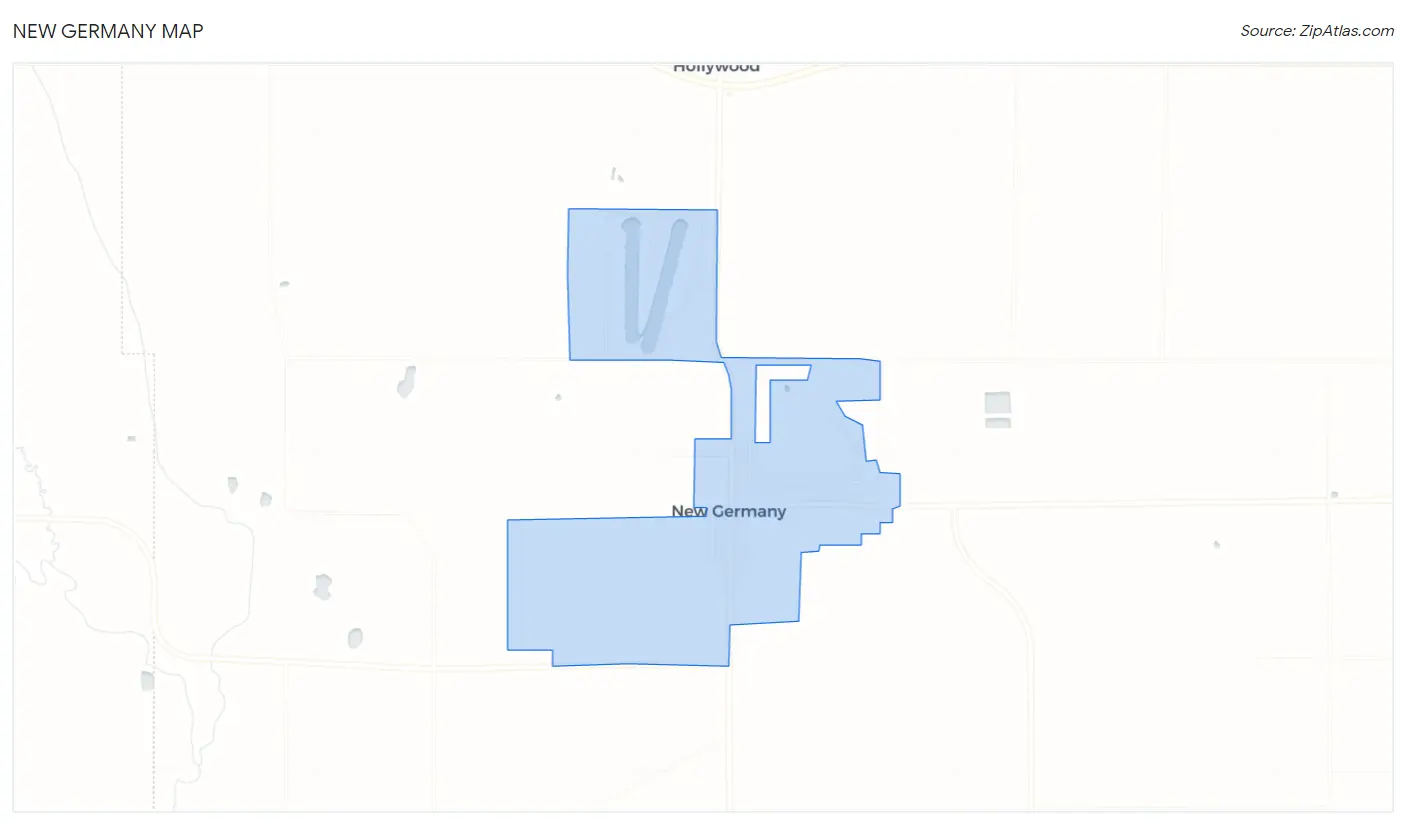
New Germany Overview
$34,543
PER CAPITA INCOME
$96,000
AVG FAMILY INCOME
$87,143
AVG HOUSEHOLD INCOME
23.7%
WAGE / INCOME GAP [ % ]
76.2¢/ $1
WAGE / INCOME GAP [ $ ]
0.33
INEQUALITY / GINI INDEX
585
TOTAL POPULATION
306
MALE POPULATION
279
FEMALE POPULATION
109.68
MALES / 100 FEMALES
91.18
FEMALES / 100 MALES
29.5
MEDIAN AGE
3.6
AVG FAMILY SIZE
2.9
AVG HOUSEHOLD SIZE
358
LABOR FORCE [ PEOPLE ]
84.4%
PERCENT IN LABOR FORCE
1.4%
UNEMPLOYMENT RATE
New Germany Zip Codes
New Germany Area Codes
Income in New Germany
Income Overview in New Germany
Per Capita Income in New Germany is $34,543, while median incomes of families and households are $96,000 and $87,143 respectively.
| Characteristic | Number | Measure |
| Per Capita Income | 585 | $34,543 |
| Median Family Income | 134 | $96,000 |
| Mean Family Income | 134 | $113,466 |
| Median Household Income | 204 | $87,143 |
| Mean Household Income | 204 | $97,349 |
| Income Deficit | 134 | $0 |
| Wage / Income Gap (%) | 585 | 23.75% |
| Wage / Income Gap ($) | 585 | 76.25¢ per $1 |
| Gini / Inequality Index | 585 | 0.33 |
Earnings by Sex in New Germany
Average Earnings in New Germany are $44,917, $50,000 for men and $38,125 for women, a difference of 23.7%.

| Sex | Number | Average Earnings |
| Male | 202 (55.0%) | $50,000 |
| Female | 165 (45.0%) | $38,125 |
| Total | 367 (100.0%) | $44,917 |
Earnings by Sex by Income Bracket in New Germany
The most common earnings brackets in New Germany are $65,000 to $74,999 for men (25 | 12.4%) and $30,000 to $34,999 for women (26 | 15.8%).
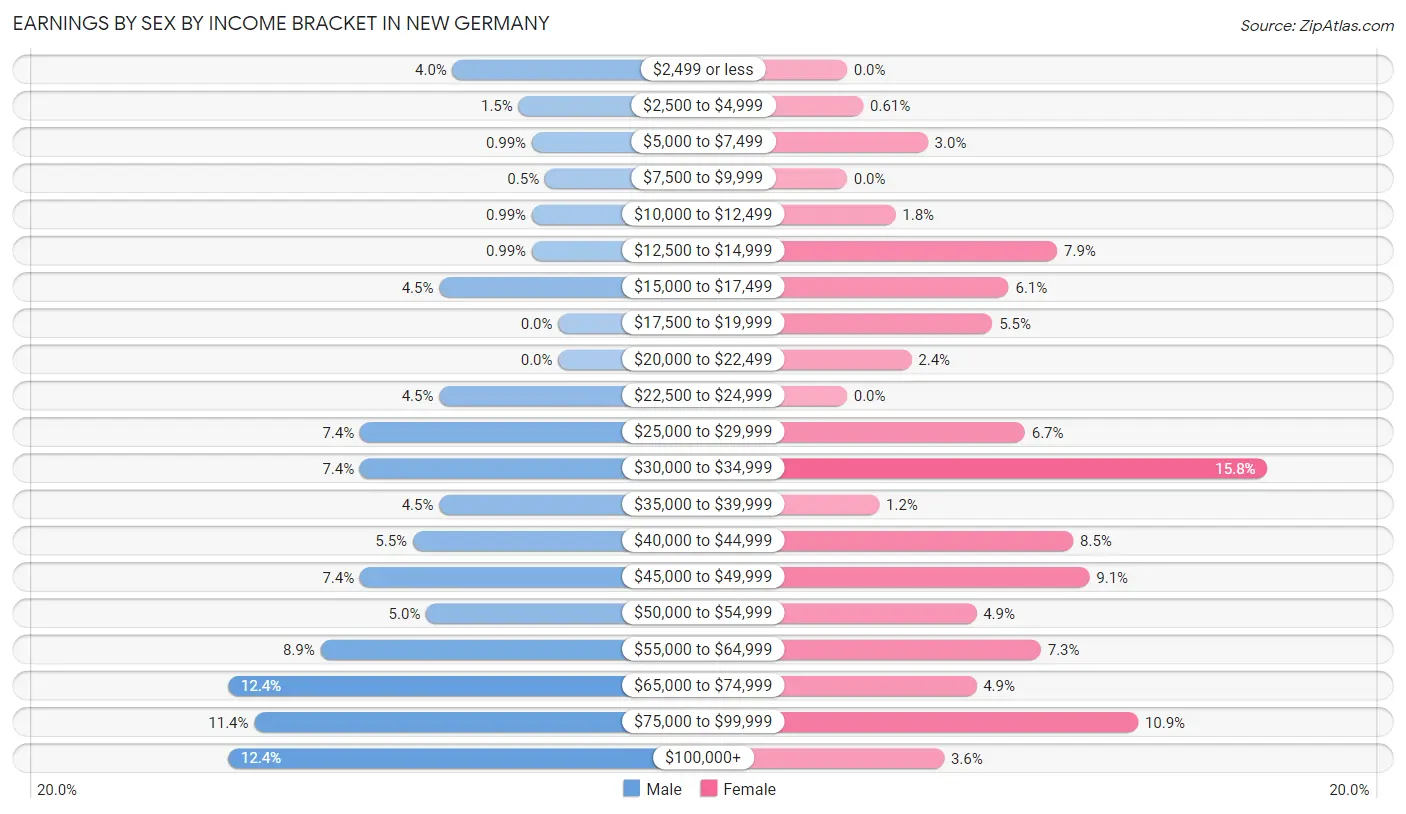
| Income | Male | Female |
| $2,499 or less | 8 (4.0%) | 0 (0.0%) |
| $2,500 to $4,999 | 3 (1.5%) | 1 (0.6%) |
| $5,000 to $7,499 | 2 (1.0%) | 5 (3.0%) |
| $7,500 to $9,999 | 1 (0.5%) | 0 (0.0%) |
| $10,000 to $12,499 | 2 (1.0%) | 3 (1.8%) |
| $12,500 to $14,999 | 2 (1.0%) | 13 (7.9%) |
| $15,000 to $17,499 | 9 (4.5%) | 10 (6.1%) |
| $17,500 to $19,999 | 0 (0.0%) | 9 (5.4%) |
| $20,000 to $22,499 | 0 (0.0%) | 4 (2.4%) |
| $22,500 to $24,999 | 9 (4.5%) | 0 (0.0%) |
| $25,000 to $29,999 | 15 (7.4%) | 11 (6.7%) |
| $30,000 to $34,999 | 15 (7.4%) | 26 (15.8%) |
| $35,000 to $39,999 | 9 (4.5%) | 2 (1.2%) |
| $40,000 to $44,999 | 11 (5.4%) | 14 (8.5%) |
| $45,000 to $49,999 | 15 (7.4%) | 15 (9.1%) |
| $50,000 to $54,999 | 10 (5.0%) | 8 (4.9%) |
| $55,000 to $64,999 | 18 (8.9%) | 12 (7.3%) |
| $65,000 to $74,999 | 25 (12.4%) | 8 (4.9%) |
| $75,000 to $99,999 | 23 (11.4%) | 18 (10.9%) |
| $100,000+ | 25 (12.4%) | 6 (3.6%) |
| Total | 202 (100.0%) | 165 (100.0%) |
Earnings by Sex by Educational Attainment in New Germany
Average earnings in New Germany are $55,313 for men and $43,500 for women, a difference of 21.4%. Men with an educational attainment of bachelor's degree enjoy the highest average annual earnings of $68,438, while those with high school diploma education earn the least with $39,750. Women with an educational attainment of graduate degree earn the most with the average annual earnings of $86,250, while those with high school diploma education have the smallest earnings of $40,000.

| Educational Attainment | Male Income | Female Income |
| Less than High School | - | - |
| High School Diploma | $39,750 | $40,000 |
| College or Associate's Degree | $67,833 | $43,125 |
| Bachelor's Degree | $68,438 | $45,938 |
| Graduate Degree | - | - |
| Total | $55,313 | $43,500 |
Family Income in New Germany
Family Income Brackets in New Germany
According to the New Germany family income data, there are 32 families falling into the $100,000 to $149,999 income range, which is the most common income bracket and makes up 23.9% of all families.

| Income Bracket | # Families | % Families |
| Less than $10,000 | 2 | 1.5% |
| $10,000 to $14,999 | 4 | 3.0% |
| $15,000 to $24,999 | 0 | 0.0% |
| $25,000 to $34,999 | 0 | 0.0% |
| $35,000 to $49,999 | 12 | 9.0% |
| $50,000 to $74,999 | 21 | 15.7% |
| $75,000 to $99,999 | 31 | 23.1% |
| $100,000 to $149,999 | 32 | 23.9% |
| $150,000 to $199,999 | 19 | 14.2% |
| $200,000+ | 13 | 9.7% |
Family Income by Famaliy Size in New Germany
6-person families (16 | 11.9%) account for the highest median family income in New Germany with $250,001 per family, while 6-person families (16 | 11.9%) have the highest median income of $41,667 per family member.

| Income Bracket | # Families | Median Income |
| 2-Person Families | 45 (33.6%) | $81,250 |
| 3-Person Families | 18 (13.4%) | $86,250 |
| 4-Person Families | 37 (27.6%) | $115,156 |
| 5-Person Families | 16 (11.9%) | $108,750 |
| 6-Person Families | 16 (11.9%) | $250,001 |
| 7+ Person Families | 2 (1.5%) | $0 |
| Total | 134 (100.0%) | $96,000 |
Family Income by Number of Earners in New Germany
The median family income in New Germany is $96,000, with families comprising 3+ earners (24) having the highest median family income of $152,500, while families with no earners (10) have the lowest median family income of $44,000, accounting for 17.9% and 7.5% of families, respectively.

| Number of Earners | # Families | Median Income |
| No Earners | 10 (7.5%) | $44,000 |
| 1 Earner | 26 (19.4%) | $73,750 |
| 2 Earners | 74 (55.2%) | $114,000 |
| 3+ Earners | 24 (17.9%) | $152,500 |
| Total | 134 (100.0%) | $96,000 |
Household Income in New Germany
Household Income Brackets in New Germany
With 47 households falling in the category, the $50,000 to $74,999 income range is the most frequent in New Germany, accounting for 23.0% of all households.

| Income Bracket | # Households | % Households |
| Less than $10,000 | 1 | 0.5% |
| $10,000 to $14,999 | 0 | 0.0% |
| $15,000 to $24,999 | 11 | 5.4% |
| $25,000 to $34,999 | 12 | 5.9% |
| $35,000 to $49,999 | 19 | 9.3% |
| $50,000 to $74,999 | 47 | 23.0% |
| $75,000 to $99,999 | 36 | 17.6% |
| $100,000 to $149,999 | 43 | 21.1% |
| $150,000 to $199,999 | 22 | 10.8% |
| $200,000+ | 13 | 6.4% |
Household Income by Householder Age in New Germany
The median household income in New Germany is $87,143, with the highest median household income of $96,875 found in the 25 to 44 years age bracket for the primary householder. A total of 100 households (49.0%) fall into this category. Meanwhile, the 15 to 24 years age bracket for the primary householder has the lowest median household income of $0, with 6 households (2.9%) in this group.

| Income Bracket | # Households | Median Income |
| 15 to 24 Years | 6 (2.9%) | $0 |
| 25 to 44 Years | 100 (49.0%) | $96,875 |
| 45 to 64 Years | 79 (38.7%) | $77,917 |
| 65+ Years | 19 (9.3%) | $58,438 |
| Total | 204 (100.0%) | $87,143 |
Poverty in New Germany
Income Below Poverty by Sex and Age in New Germany
With 2.9% poverty level for males and 4.4% for females among the residents of New Germany, under 5 year old males and 18 to 24 year old females are the most vulnerable to poverty, with 6 males (13.3%) and 8 females (20.0%) in their respective age groups living below the poverty level.
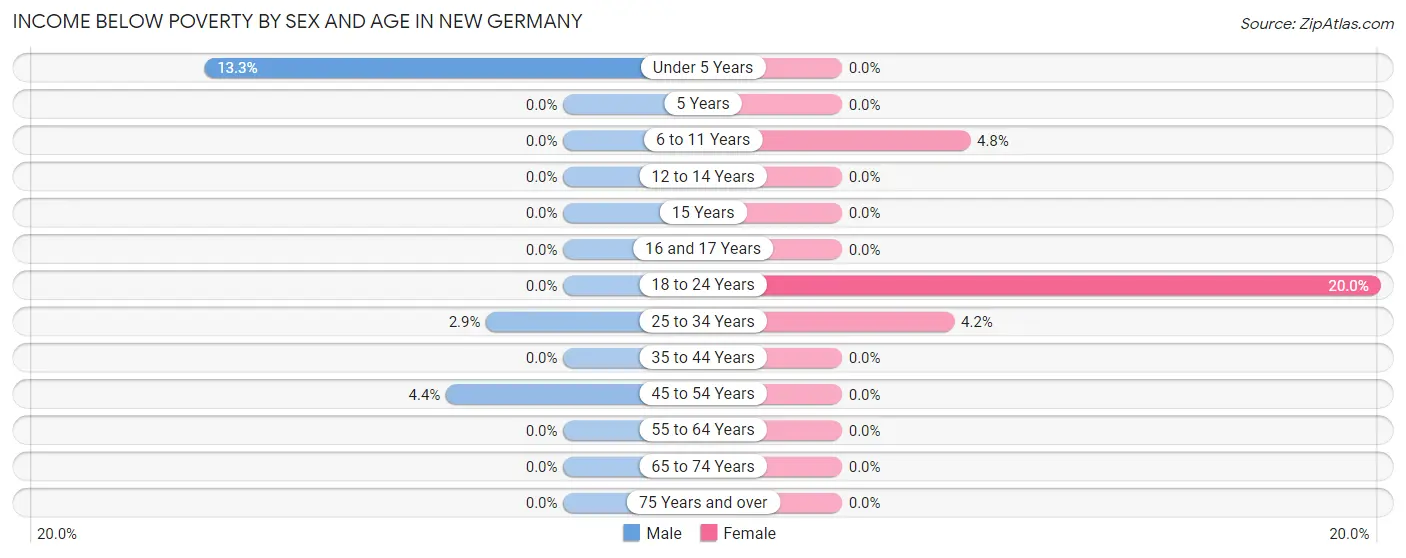
| Age Bracket | Male | Female |
| Under 5 Years | 6 (13.3%) | 0 (0.0%) |
| 5 Years | 0 (0.0%) | 0 (0.0%) |
| 6 to 11 Years | 0 (0.0%) | 2 (4.8%) |
| 12 to 14 Years | 0 (0.0%) | 0 (0.0%) |
| 15 Years | 0 (0.0%) | 0 (0.0%) |
| 16 and 17 Years | 0 (0.0%) | 0 (0.0%) |
| 18 to 24 Years | 0 (0.0%) | 8 (20.0%) |
| 25 to 34 Years | 2 (2.9%) | 2 (4.2%) |
| 35 to 44 Years | 0 (0.0%) | 0 (0.0%) |
| 45 to 54 Years | 1 (4.3%) | 0 (0.0%) |
| 55 to 64 Years | 0 (0.0%) | 0 (0.0%) |
| 65 to 74 Years | 0 (0.0%) | 0 (0.0%) |
| 75 Years and over | 0 (0.0%) | 0 (0.0%) |
| Total | 9 (2.9%) | 12 (4.4%) |
Income Above Poverty by Sex and Age in New Germany
According to the poverty statistics in New Germany, males aged 5 years and females aged under 5 years are the age groups that are most secure financially, with 100.0% of males and 100.0% of females in these age groups living above the poverty line.
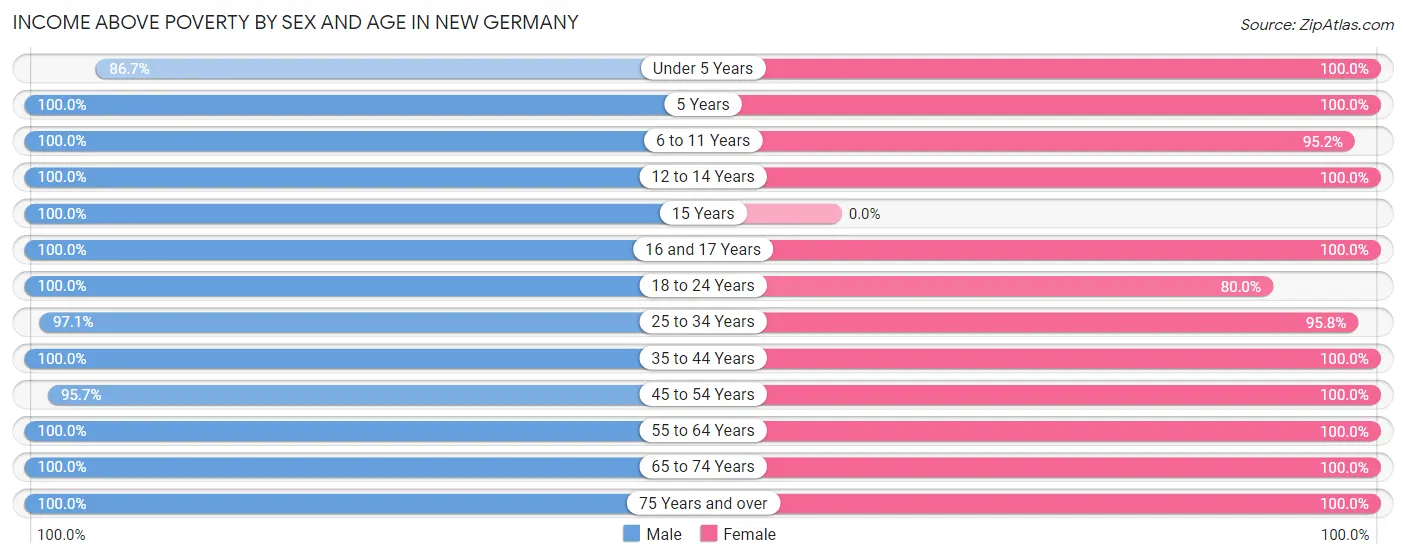
| Age Bracket | Male | Female |
| Under 5 Years | 39 (86.7%) | 17 (100.0%) |
| 5 Years | 2 (100.0%) | 1 (100.0%) |
| 6 to 11 Years | 15 (100.0%) | 40 (95.2%) |
| 12 to 14 Years | 5 (100.0%) | 20 (100.0%) |
| 15 Years | 10 (100.0%) | 0 (0.0%) |
| 16 and 17 Years | 6 (100.0%) | 3 (100.0%) |
| 18 to 24 Years | 17 (100.0%) | 32 (80.0%) |
| 25 to 34 Years | 68 (97.1%) | 46 (95.8%) |
| 35 to 44 Years | 49 (100.0%) | 30 (100.0%) |
| 45 to 54 Years | 22 (95.7%) | 26 (100.0%) |
| 55 to 64 Years | 48 (100.0%) | 29 (100.0%) |
| 65 to 74 Years | 11 (100.0%) | 13 (100.0%) |
| 75 Years and over | 5 (100.0%) | 6 (100.0%) |
| Total | 297 (97.1%) | 263 (95.6%) |
Income Below Poverty Among Married-Couple Families in New Germany

| Children | Above Poverty | Below Poverty |
| No Children | 40 (100.0%) | 0 (0.0%) |
| 1 or 2 Children | 34 (100.0%) | 0 (0.0%) |
| 3 or 4 Children | 23 (100.0%) | 0 (0.0%) |
| 5 or more Children | 2 (100.0%) | 0 (0.0%) |
| Total | 99 (100.0%) | 0 (0.0%) |
Income Below Poverty Among Single-Parent Households in New Germany

| Children | Single Father | Single Mother |
| No Children | 0 (0.0%) | 0 (0.0%) |
| 1 or 2 Children | 0 (0.0%) | 6 (75.0%) |
| 3 or 4 Children | 0 (0.0%) | 0 (0.0%) |
| 5 or more Children | 0 (0.0%) | 0 (0.0%) |
| Total | 0 (0.0%) | 6 (24.0%) |
Income Below Poverty Among Married-Couple vs Single-Parent Households in New Germany

| Children | Married-Couple Families | Single-Parent Households |
| No Children | 0 (0.0%) | 0 (0.0%) |
| 1 or 2 Children | 0 (0.0%) | 6 (50.0%) |
| 3 or 4 Children | 0 (0.0%) | 0 (0.0%) |
| 5 or more Children | 0 (0.0%) | 0 (0.0%) |
| Total | 0 (0.0%) | 6 (17.1%) |
Race in New Germany
The most populous races in New Germany are White / Caucasian (563 | 96.2%), Two or more Races (14 | 2.4%), and Hispanic or Latino (13 | 2.2%).

| Race | # Population | % Population |
| Asian | 2 | 0.3% |
| Black / African American | 1 | 0.2% |
| Hawaiian / Pacific | 0 | 0.0% |
| Hispanic or Latino | 13 | 2.2% |
| Native / Alaskan | 0 | 0.0% |
| White / Caucasian | 563 | 96.2% |
| Two or more Races | 14 | 2.4% |
| Some other Race | 5 | 0.9% |
| Total | 585 | 100.0% |
Ancestry in New Germany
The most populous ancestries reported in New Germany are German (241 | 41.2%), Norwegian (78 | 13.3%), Irish (54 | 9.2%), Swedish (54 | 9.2%), and English (33 | 5.6%), together accounting for 78.6% of all New Germany residents.
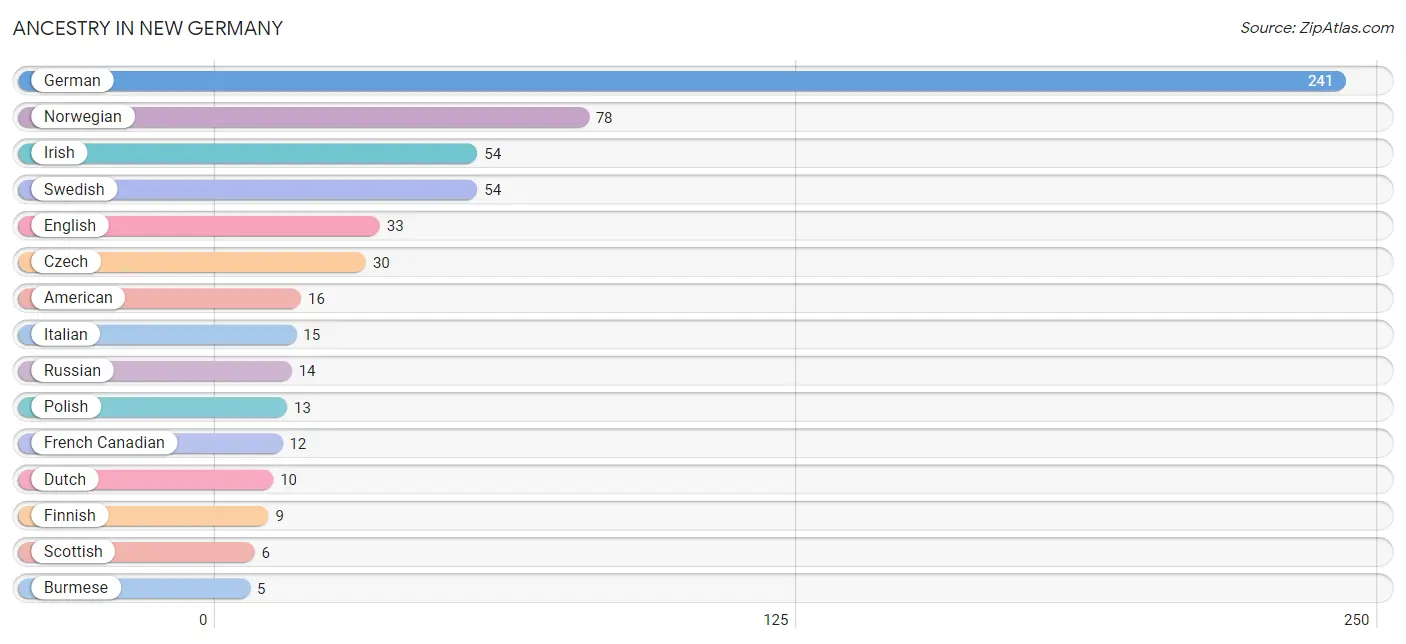
| Ancestry | # Population | % Population |
| American | 16 | 2.7% |
| Burmese | 5 | 0.9% |
| Chippewa | 1 | 0.2% |
| Czech | 30 | 5.1% |
| Danish | 2 | 0.3% |
| Dutch | 10 | 1.7% |
| English | 33 | 5.6% |
| European | 4 | 0.7% |
| Finnish | 9 | 1.5% |
| French Canadian | 12 | 2.1% |
| German | 241 | 41.2% |
| Irish | 54 | 9.2% |
| Italian | 15 | 2.6% |
| Mexican | 1 | 0.2% |
| New Zealander | 2 | 0.3% |
| Norwegian | 78 | 13.3% |
| Polish | 13 | 2.2% |
| Russian | 14 | 2.4% |
| Scandinavian | 3 | 0.5% |
| Scottish | 6 | 1.0% |
| Swedish | 54 | 9.2% |
| Ukrainian | 4 | 0.7% |
| Welsh | 2 | 0.3% | View All 23 Rows |
Immigrants in New Germany
The most numerous immigrant groups reported in New Germany came from Asia (2 | 0.3%), Eastern Asia (2 | 0.3%), and Korea (2 | 0.3%), together accounting for 1.0% of all New Germany residents.

| Immigration Origin | # Population | % Population |
| Asia | 2 | 0.3% |
| Eastern Asia | 2 | 0.3% |
| Korea | 2 | 0.3% | View All 3 Rows |
Sex and Age in New Germany
Sex and Age in New Germany
The most populous age groups in New Germany are 25 to 29 Years (47 | 15.4%) for men and 10 to 14 Years (39 | 14.0%) for women.
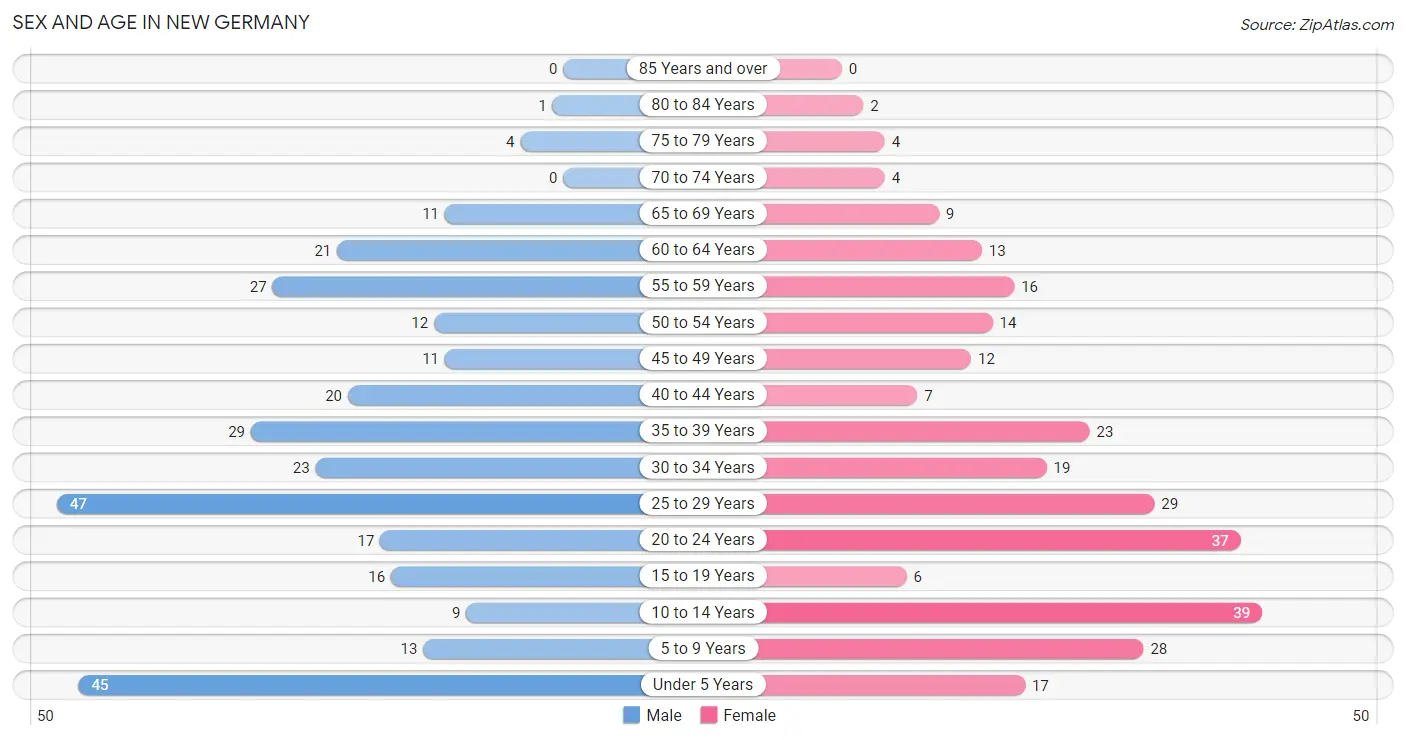
| Age Bracket | Male | Female |
| Under 5 Years | 45 (14.7%) | 17 (6.1%) |
| 5 to 9 Years | 13 (4.3%) | 28 (10.0%) |
| 10 to 14 Years | 9 (2.9%) | 39 (14.0%) |
| 15 to 19 Years | 16 (5.2%) | 6 (2.1%) |
| 20 to 24 Years | 17 (5.6%) | 37 (13.3%) |
| 25 to 29 Years | 47 (15.4%) | 29 (10.4%) |
| 30 to 34 Years | 23 (7.5%) | 19 (6.8%) |
| 35 to 39 Years | 29 (9.5%) | 23 (8.2%) |
| 40 to 44 Years | 20 (6.5%) | 7 (2.5%) |
| 45 to 49 Years | 11 (3.6%) | 12 (4.3%) |
| 50 to 54 Years | 12 (3.9%) | 14 (5.0%) |
| 55 to 59 Years | 27 (8.8%) | 16 (5.7%) |
| 60 to 64 Years | 21 (6.9%) | 13 (4.7%) |
| 65 to 69 Years | 11 (3.6%) | 9 (3.2%) |
| 70 to 74 Years | 0 (0.0%) | 4 (1.4%) |
| 75 to 79 Years | 4 (1.3%) | 4 (1.4%) |
| 80 to 84 Years | 1 (0.3%) | 2 (0.7%) |
| 85 Years and over | 0 (0.0%) | 0 (0.0%) |
| Total | 306 (100.0%) | 279 (100.0%) |
Families and Households in New Germany
Median Family Size in New Germany
The median family size in New Germany is 3.59 persons per family, with married-couple families (99 | 73.9%) accounting for the largest median family size of 3.78 persons per family. On the other hand, single female/mother families (25 | 18.7%) represent the smallest median family size with 2.88 persons per family.

| Family Type | # Families | Family Size |
| Married-Couple | 99 (73.9%) | 3.78 |
| Single Male/Father | 10 (7.5%) | 3.50 |
| Single Female/Mother | 25 (18.7%) | 2.88 |
| Total Families | 134 (100.0%) | 3.59 |
Median Household Size in New Germany
The median household size in New Germany is 2.87 persons per household, with single male/father households (10 | 4.9%) accounting for the largest median household size of 4.4 persons per household. non-family households (70 | 34.3%) represent the smallest median household size with 1.17 persons per household.

| Household Type | # Households | Household Size |
| Married-Couple | 99 (48.5%) | 3.82 |
| Single Male/Father | 10 (4.9%) | 4.40 |
| Single Female/Mother | 25 (12.2%) | 3.24 |
| Non-family | 70 (34.3%) | 1.17 |
| Total Households | 204 (100.0%) | 2.87 |
Household Size by Marriage Status in New Germany
Out of a total of 204 households in New Germany, 134 (65.7%) are family households, while 70 (34.3%) are nonfamily households. The most numerous type of family households are 2-person households, comprising 39, and the most common type of nonfamily households are 1-person households, comprising 56.

| Household Size | Family Households | Nonfamily Households |
| 1-Person Households | - | 56 (27.5%) |
| 2-Person Households | 39 (19.1%) | 14 (6.9%) |
| 3-Person Households | 20 (9.8%) | 0 (0.0%) |
| 4-Person Households | 38 (18.6%) | 0 (0.0%) |
| 5-Person Households | 19 (9.3%) | 0 (0.0%) |
| 6-Person Households | 14 (6.9%) | 0 (0.0%) |
| 7+ Person Households | 4 (2.0%) | 0 (0.0%) |
| Total | 134 (65.7%) | 70 (34.3%) |
Female Fertility in New Germany
Fertility by Age in New Germany
Average fertility rate in New Germany is 195.0 births per 1,000 women. Women in the age bracket of 35 to 50 years have the highest fertility rate with 214.0 births per 1,000 women. Women in the age bracket of 20 to 34 years acount for 65.4% of all women with births.

| Age Bracket | Women with Births | Births / 1,000 Women |
| 15 to 19 years | 0 (0.0%) | 0.0 |
| 20 to 34 years | 17 (65.4%) | 200.0 |
| 35 to 50 years | 9 (34.6%) | 214.0 |
| Total | 26 (100.0%) | 195.0 |
Fertility by Age by Marriage Status in New Germany
80.8% of women with births (26) in New Germany are married. The highest percentage of unmarried women with births falls into 20 to 34 years age bracket with 29.4% of them unmarried at the time of birth, while the lowest percentage of unmarried women with births belong to 35 to 50 years age bracket with 0.0% of them unmarried.

| Age Bracket | Married | Unmarried |
| 15 to 19 years | 0 (0.0%) | 0 (0.0%) |
| 20 to 34 years | 12 (70.6%) | 5 (29.4%) |
| 35 to 50 years | 9 (100.0%) | 0 (0.0%) |
| Total | 21 (80.8%) | 5 (19.2%) |
Fertility by Education in New Germany
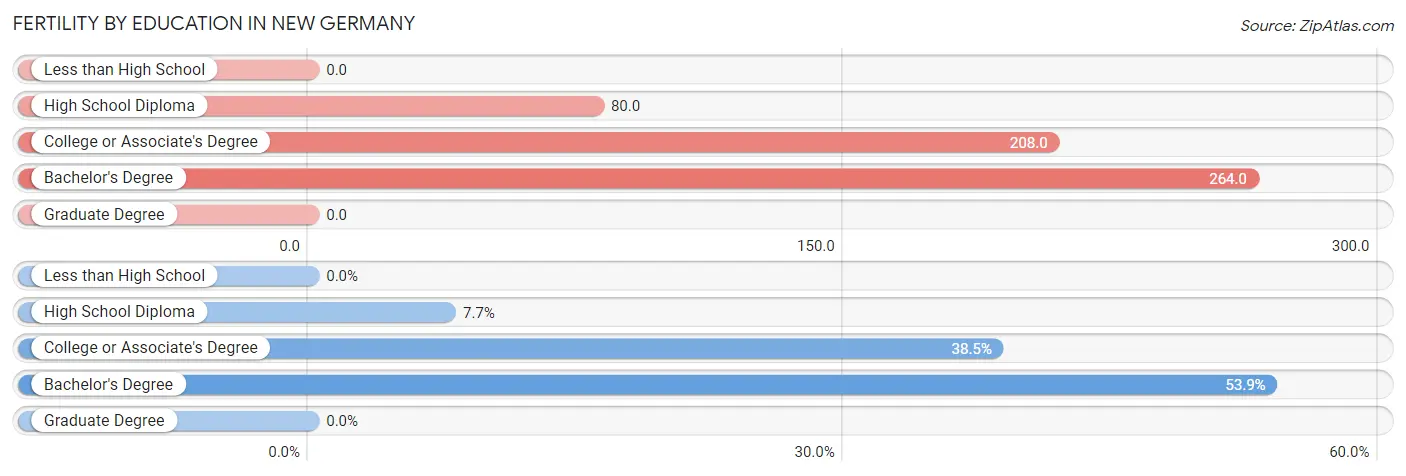
| Educational Attainment | Women with Births | Births / 1,000 Women |
| Less than High School | 0 (0.0%) | 0.0 |
| High School Diploma | 2 (7.7%) | 80.0 |
| College or Associate's Degree | 10 (38.5%) | 208.0 |
| Bachelor's Degree | 14 (53.8%) | 264.0 |
| Graduate Degree | 0 (0.0%) | 0.0 |
| Total | 26 (100.0%) | 195.0 |
Fertility by Education by Marriage Status in New Germany
19.2% of women with births in New Germany are unmarried. Women with the educational attainment of high school diploma are most likely to be married with 100.0% of them married at childbirth, while women with the educational attainment of college or associate's degree are least likely to be married with 50.0% of them unmarried at childbirth.

| Educational Attainment | Married | Unmarried |
| Less than High School | 0 (0.0%) | 0 (0.0%) |
| High School Diploma | 2 (100.0%) | 0 (0.0%) |
| College or Associate's Degree | 5 (50.0%) | 5 (50.0%) |
| Bachelor's Degree | 14 (100.0%) | 0 (0.0%) |
| Graduate Degree | 0 (0.0%) | 0 (0.0%) |
| Total | 21 (80.8%) | 5 (19.2%) |
Employment Characteristics in New Germany
Employment by Class of Employer in New Germany
Among the 344 employed individuals in New Germany, private company employees (288 | 83.7%), not-for-profit organizations (19 | 5.5%), and self-employed (not incorporated) (17 | 4.9%) make up the most common classes of employment.

| Employer Class | # Employees | % Employees |
| Private Company Employees | 288 | 83.7% |
| Self-Employed (Incorporated) | 4 | 1.2% |
| Self-Employed (Not Incorporated) | 17 | 4.9% |
| Not-for-profit Organizations | 19 | 5.5% |
| Local Government Employees | 7 | 2.0% |
| State Government Employees | 3 | 0.9% |
| Federal Government Employees | 6 | 1.7% |
| Unpaid Family Workers | 0 | 0.0% |
| Total | 344 | 100.0% |
Employment Status by Age in New Germany
According to the labor force statistics for New Germany, out of the total population over 16 years of age (424), 84.4% or 358 individuals are in the labor force, with 1.4% or 5 of them unemployed. The age group with the highest labor force participation rate is 45 to 54 years, with 100.0% or 49 individuals in the labor force. Within the labor force, the 65 to 74 years age range has the highest percentage of unemployed individuals, with 25.0% or 2 of them being unemployed.

| Age Bracket | In Labor Force | Unemployed |
| 16 to 19 Years | 3 (25.0%) | 0 (0.0%) |
| 20 to 24 Years | 52 (96.3%) | 2 (3.8%) |
| 25 to 29 Years | 73 (96.1%) | 1 (1.4%) |
| 30 to 34 Years | 36 (85.7%) | 0 (0.0%) |
| 35 to 44 Years | 74 (93.7%) | 0 (0.0%) |
| 45 to 54 Years | 49 (100.0%) | 0 (0.0%) |
| 55 to 59 Years | 32 (74.4%) | 0 (0.0%) |
| 60 to 64 Years | 31 (91.2%) | 0 (0.0%) |
| 65 to 74 Years | 8 (33.3%) | 2 (25.0%) |
| 75 Years and over | 0 (0.0%) | 0 (0.0%) |
| Total | 358 (84.4%) | 5 (1.4%) |
Employment Status by Educational Attainment in New Germany
According to labor force statistics for New Germany, 91.3% of individuals (295) out of the total population between 25 and 64 years of age (323) are in the labor force, with 0.3% or 1 of them being unemployed. The group with the highest labor force participation rate are those with the educational attainment of less than high school, with 100.0% or 4 individuals in the labor force. Within the labor force, individuals with high school diploma education have the highest percentage of unemployment, with 1.1% or 1 of them being unemployed.

| Educational Attainment | In Labor Force | Unemployed |
| Less than High School | 4 (100.0%) | 0 (0.0%) |
| High School Diploma | 91 (86.7%) | 1 (1.1%) |
| College / Associate Degree | 131 (93.6%) | 0 (0.0%) |
| Bachelor's Degree or higher | 69 (93.2%) | 0 (0.0%) |
| Total | 295 (91.3%) | 1 (0.3%) |
Employment Occupations by Sex in New Germany
Management, Business, Science and Arts Occupations
The most common Management, Business, Science and Arts occupations in New Germany are Business & Financial (28 | 7.9%), Community & Social Service (22 | 6.2%), Health Diagnosing & Treating (21 | 5.9%), Management (17 | 4.8%), and Health Technologists (14 | 4.0%).
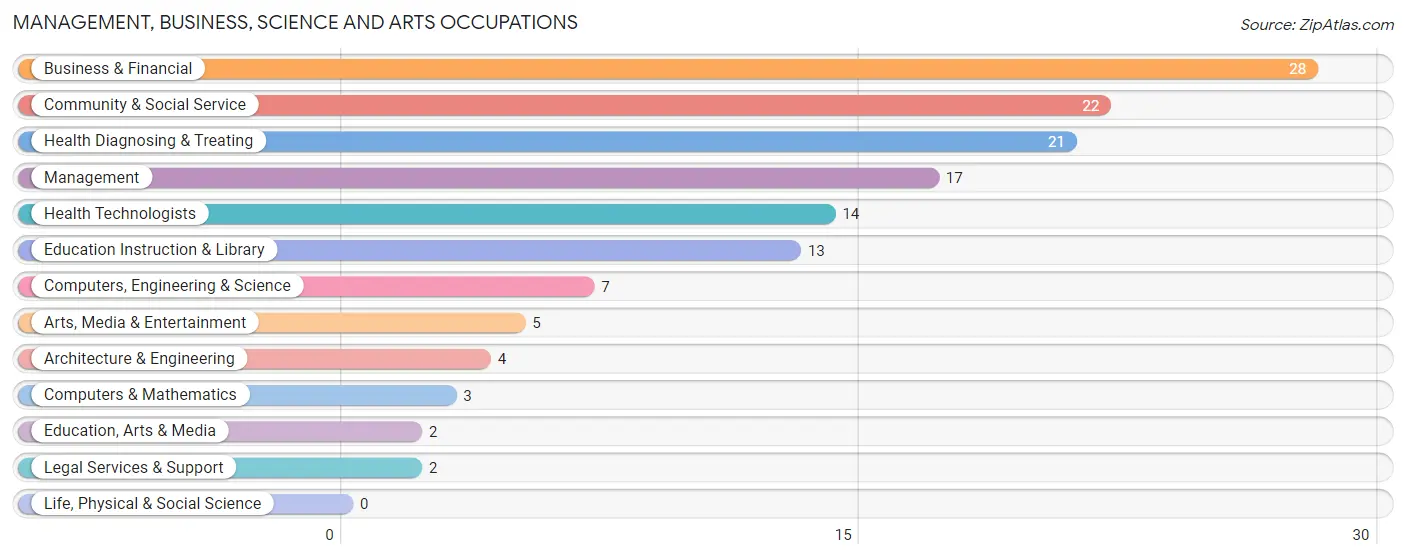
Management, Business, Science and Arts Occupations by Sex
Within the Management, Business, Science and Arts occupations in New Germany, the most male-oriented occupations are Computers, Engineering & Science (100.0%), Computers & Mathematics (100.0%), and Architecture & Engineering (100.0%), while the most female-oriented occupations are Legal Services & Support (100.0%), Education Instruction & Library (100.0%), and Health Technologists (100.0%).
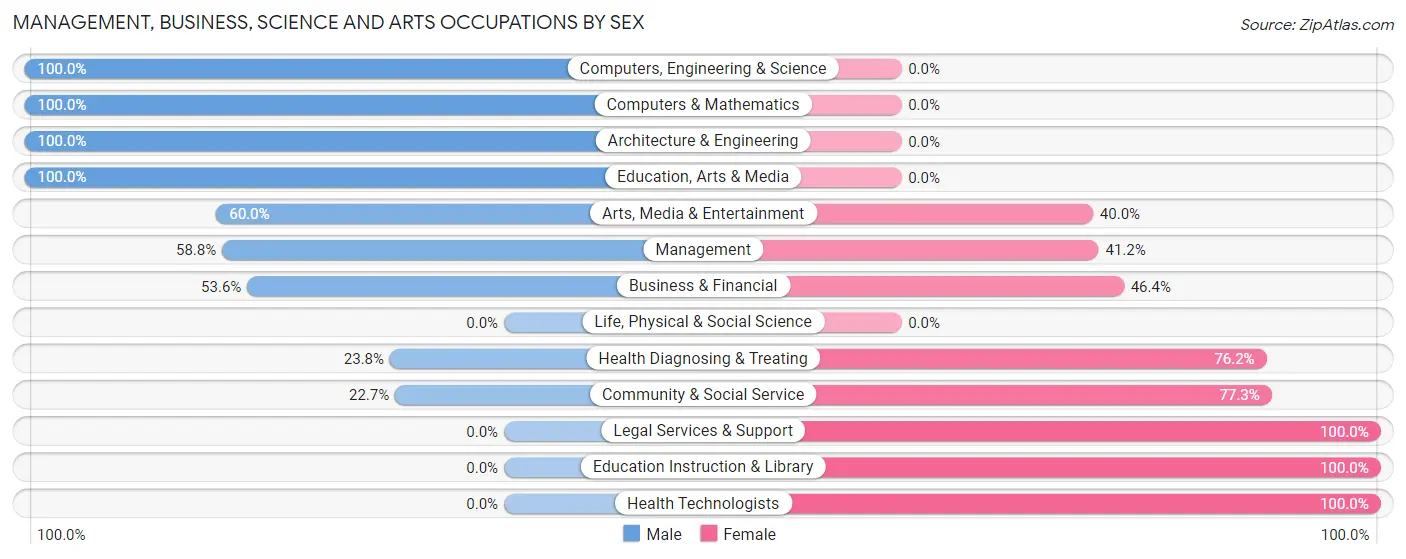
| Occupation | Male | Female |
| Management | 10 (58.8%) | 7 (41.2%) |
| Business & Financial | 15 (53.6%) | 13 (46.4%) |
| Computers, Engineering & Science | 7 (100.0%) | 0 (0.0%) |
| Computers & Mathematics | 3 (100.0%) | 0 (0.0%) |
| Architecture & Engineering | 4 (100.0%) | 0 (0.0%) |
| Life, Physical & Social Science | 0 (0.0%) | 0 (0.0%) |
| Community & Social Service | 5 (22.7%) | 17 (77.3%) |
| Education, Arts & Media | 2 (100.0%) | 0 (0.0%) |
| Legal Services & Support | 0 (0.0%) | 2 (100.0%) |
| Education Instruction & Library | 0 (0.0%) | 13 (100.0%) |
| Arts, Media & Entertainment | 3 (60.0%) | 2 (40.0%) |
| Health Diagnosing & Treating | 5 (23.8%) | 16 (76.2%) |
| Health Technologists | 0 (0.0%) | 14 (100.0%) |
| Total (Category) | 42 (44.2%) | 53 (55.8%) |
| Total (Overall) | 188 (53.3%) | 165 (46.7%) |
Services Occupations
The most common Services occupations in New Germany are Cleaning & Maintenance (17 | 4.8%), Food Preparation & Serving (13 | 3.7%), Personal Care & Service (7 | 2.0%), and Healthcare Support (2 | 0.6%).

Services Occupations by Sex

| Occupation | Male | Female |
| Healthcare Support | 0 (0.0%) | 2 (100.0%) |
| Security & Protection | 0 (0.0%) | 0 (0.0%) |
| Firefighting & Prevention | 0 (0.0%) | 0 (0.0%) |
| Law Enforcement | 0 (0.0%) | 0 (0.0%) |
| Food Preparation & Serving | 0 (0.0%) | 13 (100.0%) |
| Cleaning & Maintenance | 13 (76.5%) | 4 (23.5%) |
| Personal Care & Service | 0 (0.0%) | 7 (100.0%) |
| Total (Category) | 13 (33.3%) | 26 (66.7%) |
| Total (Overall) | 188 (53.3%) | 165 (46.7%) |
Sales and Office Occupations
The most common Sales and Office occupations in New Germany are Office & Administration (53 | 15.0%), and Sales & Related (35 | 9.9%).

Sales and Office Occupations by Sex

| Occupation | Male | Female |
| Sales & Related | 20 (57.1%) | 15 (42.9%) |
| Office & Administration | 15 (28.3%) | 38 (71.7%) |
| Total (Category) | 35 (39.8%) | 53 (60.2%) |
| Total (Overall) | 188 (53.3%) | 165 (46.7%) |
Natural Resources, Construction and Maintenance Occupations
The most common Natural Resources, Construction and Maintenance occupations in New Germany are Installation, Maintenance & Repair (18 | 5.1%), and Construction & Extraction (17 | 4.8%).

Natural Resources, Construction and Maintenance Occupations by Sex

| Occupation | Male | Female |
| Farming, Fishing & Forestry | 0 (0.0%) | 0 (0.0%) |
| Construction & Extraction | 17 (100.0%) | 0 (0.0%) |
| Installation, Maintenance & Repair | 18 (100.0%) | 0 (0.0%) |
| Total (Category) | 35 (100.0%) | 0 (0.0%) |
| Total (Overall) | 188 (53.3%) | 165 (46.7%) |
Production, Transportation and Moving Occupations
The most common Production, Transportation and Moving occupations in New Germany are Production (59 | 16.7%), Transportation (27 | 7.6%), and Material Moving (10 | 2.8%).

Production, Transportation and Moving Occupations by Sex

| Occupation | Male | Female |
| Production | 28 (47.5%) | 31 (52.5%) |
| Transportation | 27 (100.0%) | 0 (0.0%) |
| Material Moving | 8 (80.0%) | 2 (20.0%) |
| Total (Category) | 63 (65.6%) | 33 (34.4%) |
| Total (Overall) | 188 (53.3%) | 165 (46.7%) |
Employment Industries by Sex in New Germany
Employment Industries in New Germany
The major employment industries in New Germany include Manufacturing (79 | 22.4%), Retail Trade (52 | 14.7%), Finance & Insurance (42 | 11.9%), Health Care & Social Assistance (41 | 11.6%), and Construction (36 | 10.2%).
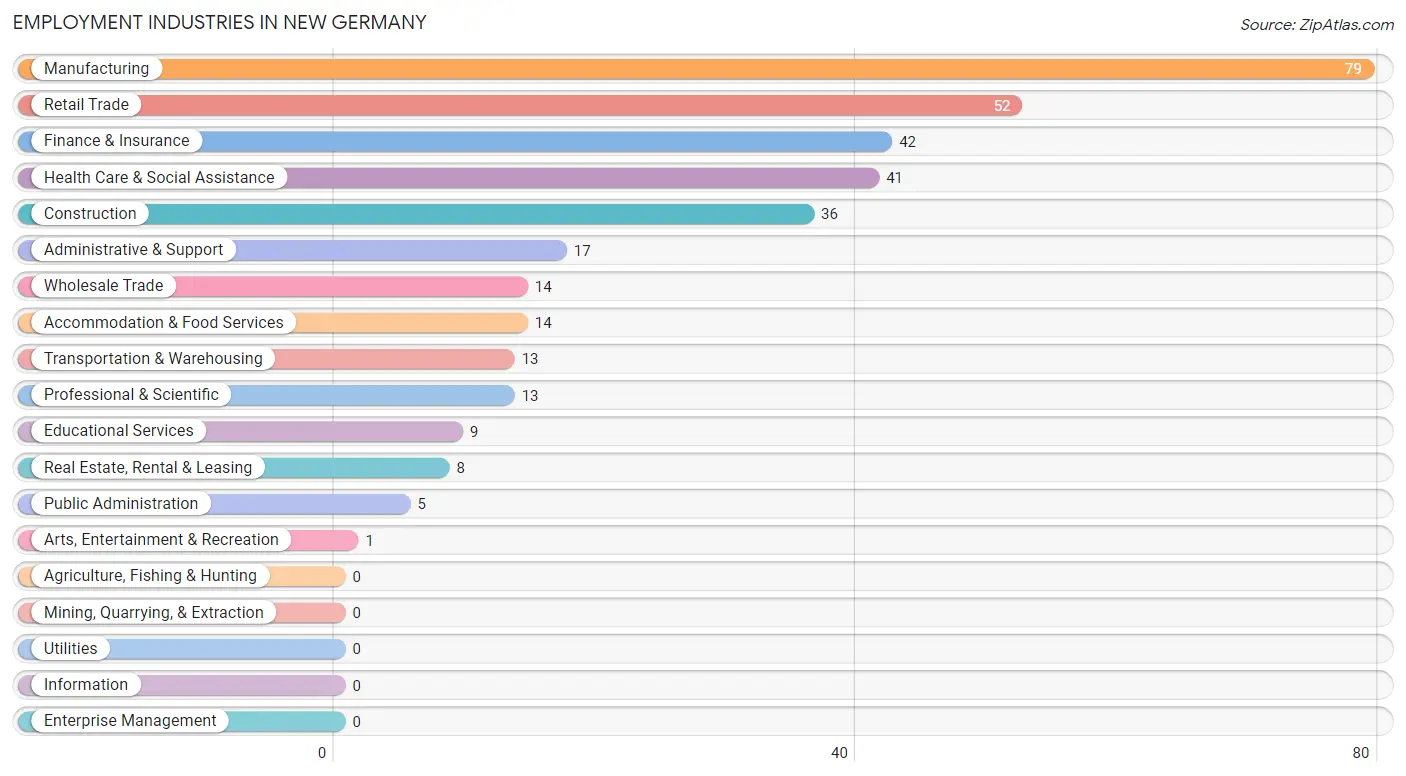
Employment Industries by Sex in New Germany
The New Germany industries that see more men than women are Construction (100.0%), Arts, Entertainment & Recreation (100.0%), and Public Administration (80.0%), whereas the industries that tend to have a higher number of women are Health Care & Social Assistance (100.0%), Professional & Scientific (92.3%), and Educational Services (88.9%).
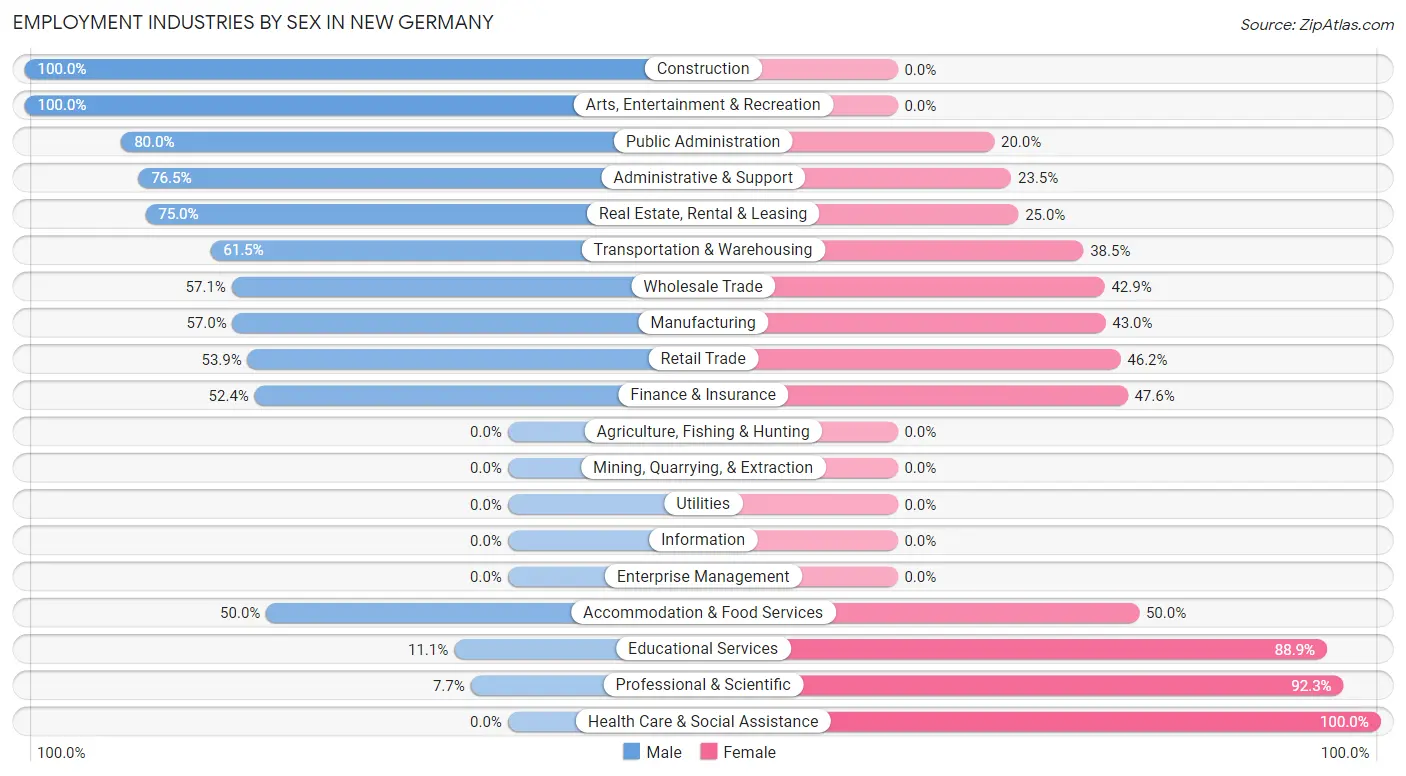
| Industry | Male | Female |
| Agriculture, Fishing & Hunting | 0 (0.0%) | 0 (0.0%) |
| Mining, Quarrying, & Extraction | 0 (0.0%) | 0 (0.0%) |
| Construction | 36 (100.0%) | 0 (0.0%) |
| Manufacturing | 45 (57.0%) | 34 (43.0%) |
| Wholesale Trade | 8 (57.1%) | 6 (42.9%) |
| Retail Trade | 28 (53.8%) | 24 (46.2%) |
| Transportation & Warehousing | 8 (61.5%) | 5 (38.5%) |
| Utilities | 0 (0.0%) | 0 (0.0%) |
| Information | 0 (0.0%) | 0 (0.0%) |
| Finance & Insurance | 22 (52.4%) | 20 (47.6%) |
| Real Estate, Rental & Leasing | 6 (75.0%) | 2 (25.0%) |
| Professional & Scientific | 1 (7.7%) | 12 (92.3%) |
| Enterprise Management | 0 (0.0%) | 0 (0.0%) |
| Administrative & Support | 13 (76.5%) | 4 (23.5%) |
| Educational Services | 1 (11.1%) | 8 (88.9%) |
| Health Care & Social Assistance | 0 (0.0%) | 41 (100.0%) |
| Arts, Entertainment & Recreation | 1 (100.0%) | 0 (0.0%) |
| Accommodation & Food Services | 7 (50.0%) | 7 (50.0%) |
| Public Administration | 4 (80.0%) | 1 (20.0%) |
| Total | 188 (53.3%) | 165 (46.7%) |
Education in New Germany
School Enrollment in New Germany
The most common levels of schooling among the 124 students in New Germany are middle school (32 | 25.8%), elementary school (29 | 23.4%), and college / undergraduate (21 | 16.9%).

| School Level | # Students | % Students |
| Nursery / Preschool | 4 | 3.2% |
| Kindergarten | 17 | 13.7% |
| Elementary School | 29 | 23.4% |
| Middle School | 32 | 25.8% |
| High School | 19 | 15.3% |
| College / Undergraduate | 21 | 16.9% |
| Graduate / Professional | 2 | 1.6% |
| Total | 124 | 100.0% |
School Enrollment by Age by Funding Source in New Germany
Out of a total of 124 students who are enrolled in schools in New Germany, 34 (27.4%) attend a private institution, while the remaining 90 (72.6%) are enrolled in public schools. The age group of 3 to 4 year olds has the highest likelihood of being enrolled in private schools, with 3 (75.0% in the age bracket) enrolled. Conversely, the age group of 20 to 24 year olds has the lowest likelihood of being enrolled in a private school, with 8 (88.9% in the age bracket) attending a public institution.

| Age Bracket | Public School | Private School |
| 3 to 4 Year Olds | 1 (25.0%) | 3 (75.0%) |
| 5 to 9 Year Old | 24 (68.6%) | 11 (31.4%) |
| 10 to 14 Year Olds | 32 (74.4%) | 11 (25.6%) |
| 15 to 17 Year Olds | 16 (84.2%) | 3 (15.8%) |
| 18 to 19 Year Olds | 0 (0.0%) | 0 (0.0%) |
| 20 to 24 Year Olds | 8 (88.9%) | 1 (11.1%) |
| 25 to 34 Year Olds | 5 (83.3%) | 1 (16.7%) |
| 35 Years and over | 4 (50.0%) | 4 (50.0%) |
| Total | 90 (72.6%) | 34 (27.4%) |
Educational Attainment by Field of Study in New Germany
Business (30 | 33.3%), science & technology (12 | 13.3%), education (12 | 13.3%), arts & humanities (11 | 12.2%), and liberal arts & history (5 | 5.6%) are the most common fields of study among 90 individuals in New Germany who have obtained a bachelor's degree or higher.
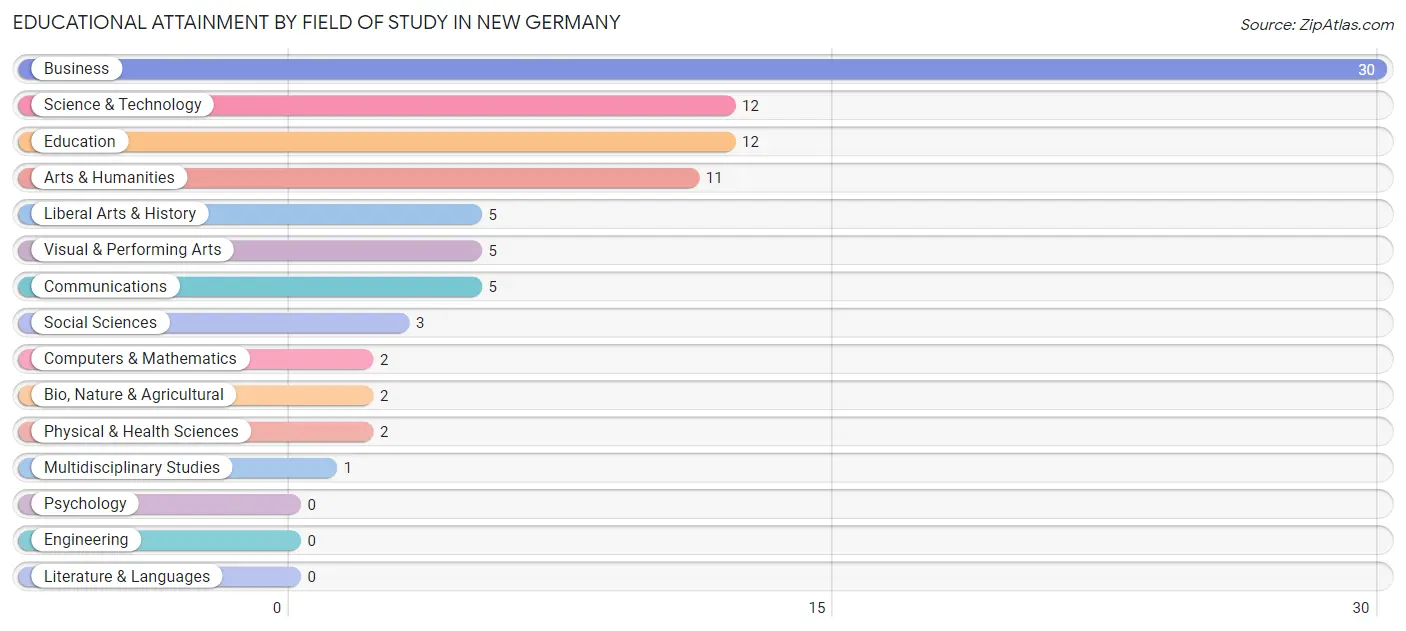
| Field of Study | # Graduates | % Graduates |
| Computers & Mathematics | 2 | 2.2% |
| Bio, Nature & Agricultural | 2 | 2.2% |
| Physical & Health Sciences | 2 | 2.2% |
| Psychology | 0 | 0.0% |
| Social Sciences | 3 | 3.3% |
| Engineering | 0 | 0.0% |
| Multidisciplinary Studies | 1 | 1.1% |
| Science & Technology | 12 | 13.3% |
| Business | 30 | 33.3% |
| Education | 12 | 13.3% |
| Literature & Languages | 0 | 0.0% |
| Liberal Arts & History | 5 | 5.6% |
| Visual & Performing Arts | 5 | 5.6% |
| Communications | 5 | 5.6% |
| Arts & Humanities | 11 | 12.2% |
| Total | 90 | 100.0% |
Transportation & Commute in New Germany
Vehicle Availability by Sex in New Germany
The most prevalent vehicle ownership categories in New Germany are males with 2 vehicles (91, accounting for 48.4%) and females with 2 vehicles (59, making up 58.3%).

| Vehicles Available | Male | Female |
| No Vehicle | 1 (0.5%) | 6 (3.8%) |
| 1 Vehicle | 17 (9.0%) | 3 (1.9%) |
| 2 Vehicles | 91 (48.4%) | 59 (37.8%) |
| 3 Vehicles | 42 (22.3%) | 38 (24.4%) |
| 4 Vehicles | 10 (5.3%) | 12 (7.7%) |
| 5 or more Vehicles | 27 (14.4%) | 38 (24.4%) |
| Total | 188 (100.0%) | 156 (100.0%) |
Commute Time in New Germany
The most frequently occuring commute durations in New Germany are 30 to 34 minutes (87 commuters, 27.5%), 20 to 24 minutes (42 commuters, 13.3%), and 15 to 19 minutes (34 commuters, 10.8%).
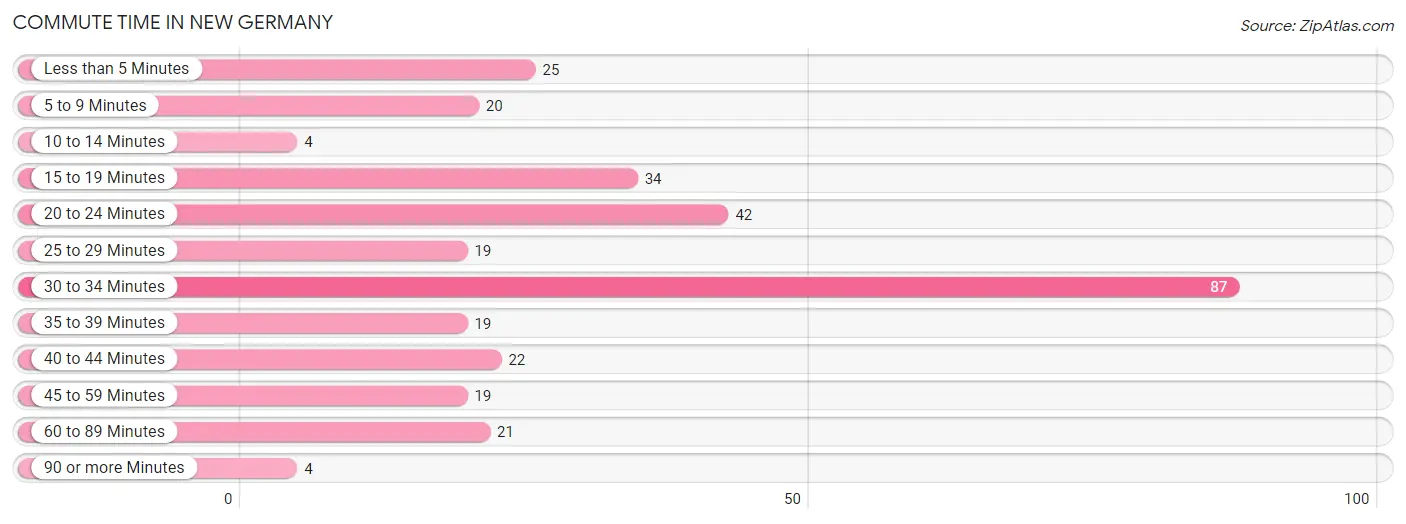
| Commute Time | # Commuters | % Commuters |
| Less than 5 Minutes | 25 | 7.9% |
| 5 to 9 Minutes | 20 | 6.3% |
| 10 to 14 Minutes | 4 | 1.3% |
| 15 to 19 Minutes | 34 | 10.8% |
| 20 to 24 Minutes | 42 | 13.3% |
| 25 to 29 Minutes | 19 | 6.0% |
| 30 to 34 Minutes | 87 | 27.5% |
| 35 to 39 Minutes | 19 | 6.0% |
| 40 to 44 Minutes | 22 | 7.0% |
| 45 to 59 Minutes | 19 | 6.0% |
| 60 to 89 Minutes | 21 | 6.7% |
| 90 or more Minutes | 4 | 1.3% |
Commute Time by Sex in New Germany
The most common commute times in New Germany are 30 to 34 minutes (60 commuters, 34.1%) for males and 30 to 34 minutes (27 commuters, 19.3%) for females.
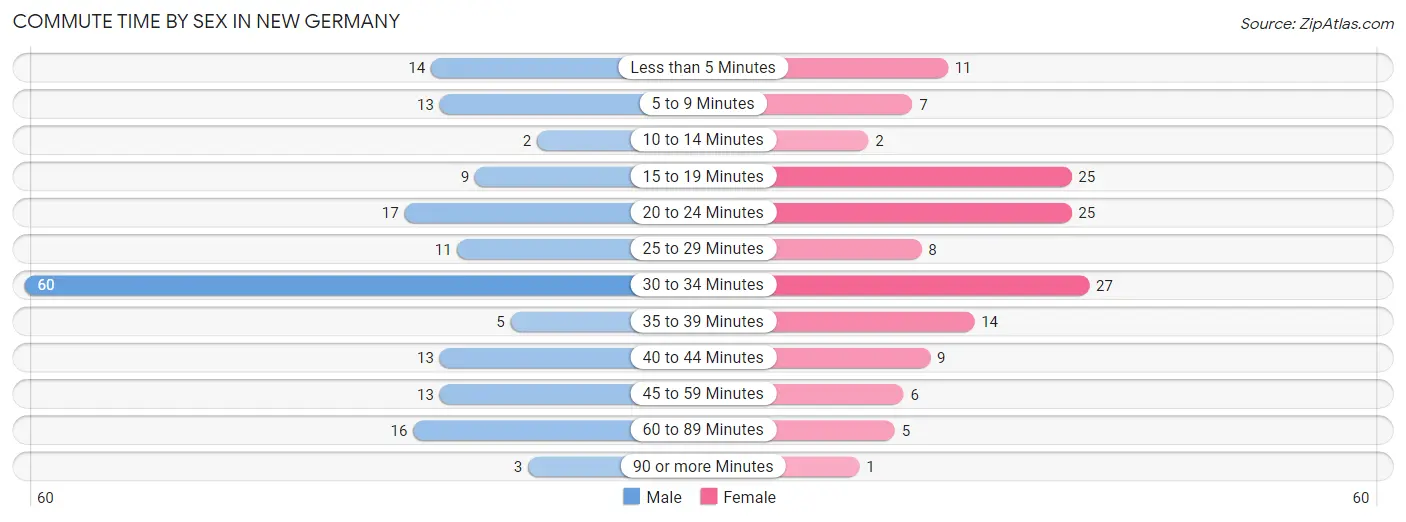
| Commute Time | Male | Female |
| Less than 5 Minutes | 14 (8.0%) | 11 (7.9%) |
| 5 to 9 Minutes | 13 (7.4%) | 7 (5.0%) |
| 10 to 14 Minutes | 2 (1.1%) | 2 (1.4%) |
| 15 to 19 Minutes | 9 (5.1%) | 25 (17.9%) |
| 20 to 24 Minutes | 17 (9.7%) | 25 (17.9%) |
| 25 to 29 Minutes | 11 (6.2%) | 8 (5.7%) |
| 30 to 34 Minutes | 60 (34.1%) | 27 (19.3%) |
| 35 to 39 Minutes | 5 (2.8%) | 14 (10.0%) |
| 40 to 44 Minutes | 13 (7.4%) | 9 (6.4%) |
| 45 to 59 Minutes | 13 (7.4%) | 6 (4.3%) |
| 60 to 89 Minutes | 16 (9.1%) | 5 (3.6%) |
| 90 or more Minutes | 3 (1.7%) | 1 (0.7%) |
Time of Departure to Work by Sex in New Germany
The most frequent times of departure to work in New Germany are 5:00 AM to 5:29 AM (35, 19.9%) for males and 12:00 PM to 3:59 PM (23, 16.4%) for females.
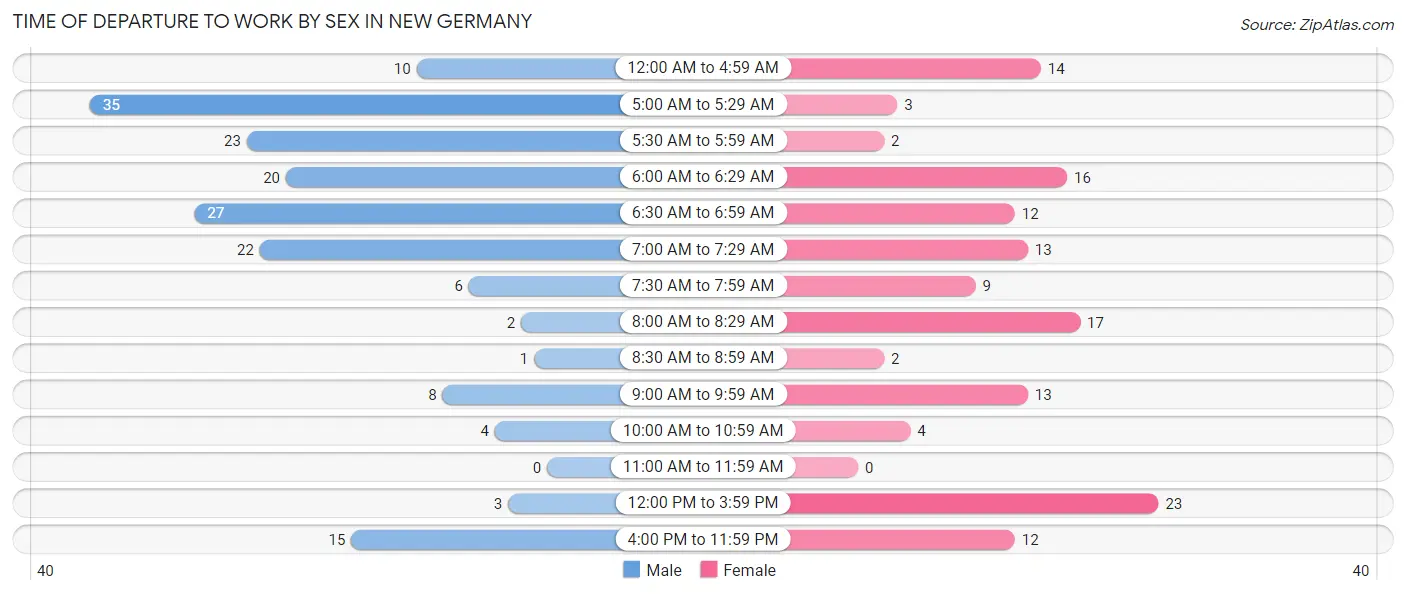
| Time of Departure | Male | Female |
| 12:00 AM to 4:59 AM | 10 (5.7%) | 14 (10.0%) |
| 5:00 AM to 5:29 AM | 35 (19.9%) | 3 (2.1%) |
| 5:30 AM to 5:59 AM | 23 (13.1%) | 2 (1.4%) |
| 6:00 AM to 6:29 AM | 20 (11.4%) | 16 (11.4%) |
| 6:30 AM to 6:59 AM | 27 (15.3%) | 12 (8.6%) |
| 7:00 AM to 7:29 AM | 22 (12.5%) | 13 (9.3%) |
| 7:30 AM to 7:59 AM | 6 (3.4%) | 9 (6.4%) |
| 8:00 AM to 8:29 AM | 2 (1.1%) | 17 (12.1%) |
| 8:30 AM to 8:59 AM | 1 (0.6%) | 2 (1.4%) |
| 9:00 AM to 9:59 AM | 8 (4.5%) | 13 (9.3%) |
| 10:00 AM to 10:59 AM | 4 (2.3%) | 4 (2.9%) |
| 11:00 AM to 11:59 AM | 0 (0.0%) | 0 (0.0%) |
| 12:00 PM to 3:59 PM | 3 (1.7%) | 23 (16.4%) |
| 4:00 PM to 11:59 PM | 15 (8.5%) | 12 (8.6%) |
| Total | 176 (100.0%) | 140 (100.0%) |
Housing Occupancy in New Germany
Occupancy by Ownership in New Germany
Of the total 204 dwellings in New Germany, owner-occupied units account for 170 (83.3%), while renter-occupied units make up 34 (16.7%).

| Occupancy | # Housing Units | % Housing Units |
| Owner Occupied Housing Units | 170 | 83.3% |
| Renter-Occupied Housing Units | 34 | 16.7% |
| Total Occupied Housing Units | 204 | 100.0% |
Occupancy by Household Size in New Germany

| Household Size | # Housing Units | % Housing Units |
| 1-Person Household | 56 | 27.5% |
| 2-Person Household | 53 | 26.0% |
| 3-Person Household | 20 | 9.8% |
| 4+ Person Household | 75 | 36.8% |
| Total Housing Units | 204 | 100.0% |
Occupancy by Ownership by Household Size in New Germany

| Household Size | Owner-occupied | Renter-occupied |
| 1-Person Household | 41 (73.2%) | 15 (26.8%) |
| 2-Person Household | 53 (100.0%) | 0 (0.0%) |
| 3-Person Household | 16 (80.0%) | 4 (20.0%) |
| 4+ Person Household | 60 (80.0%) | 15 (20.0%) |
| Total Housing Units | 170 (83.3%) | 34 (16.7%) |
Occupancy by Educational Attainment in New Germany

| Household Size | Owner-occupied | Renter-occupied |
| Less than High School | 1 (100.0%) | 0 (0.0%) |
| High School Diploma | 48 (81.4%) | 11 (18.6%) |
| College/Associate Degree | 84 (83.2%) | 17 (16.8%) |
| Bachelor's Degree or higher | 37 (86.1%) | 6 (14.0%) |
Occupancy by Age of Householder in New Germany

| Age Bracket | # Households | % Households |
| Under 35 Years | 71 | 34.8% |
| 35 to 44 Years | 35 | 17.2% |
| 45 to 54 Years | 29 | 14.2% |
| 55 to 64 Years | 50 | 24.5% |
| 65 to 74 Years | 13 | 6.4% |
| 75 to 84 Years | 6 | 2.9% |
| 85 Years and Over | 0 | 0.0% |
| Total | 204 | 100.0% |
Housing Finances in New Germany
Median Income by Occupancy in New Germany

| Occupancy Type | # Households | Median Income |
| Owner-Occupied | 170 (83.3%) | $93,125 |
| Renter-Occupied | 34 (16.7%) | $46,250 |
| Average | 204 (100.0%) | $87,143 |
Occupancy by Householder Income Bracket in New Germany
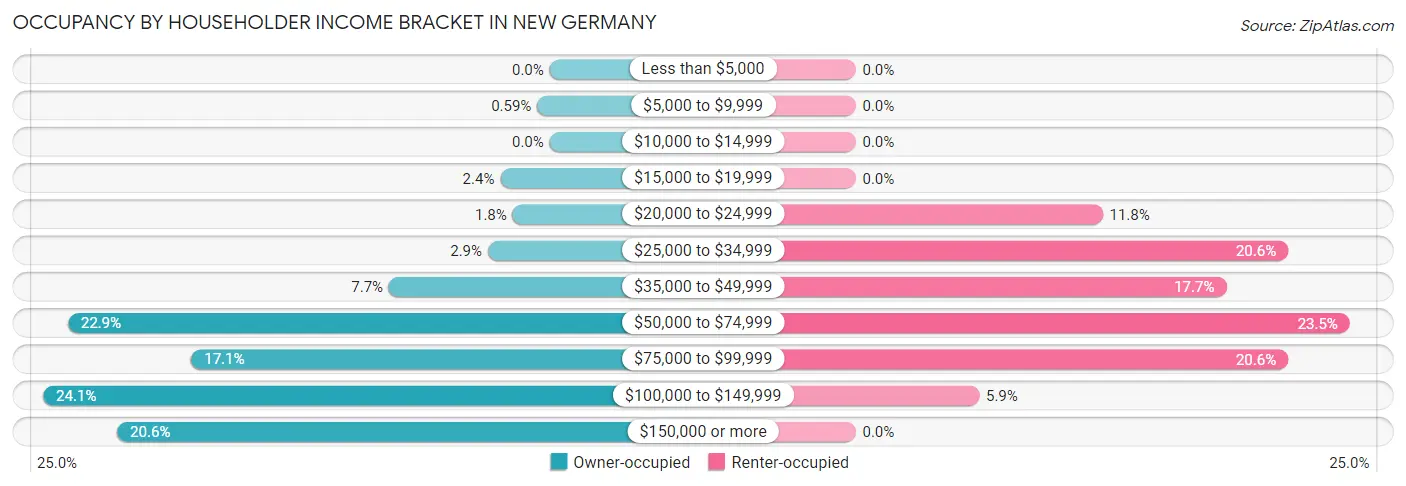
| Income Bracket | Owner-occupied | Renter-occupied |
| Less than $5,000 | 0 (0.0%) | 0 (0.0%) |
| $5,000 to $9,999 | 1 (0.6%) | 0 (0.0%) |
| $10,000 to $14,999 | 0 (0.0%) | 0 (0.0%) |
| $15,000 to $19,999 | 4 (2.4%) | 0 (0.0%) |
| $20,000 to $24,999 | 3 (1.8%) | 4 (11.8%) |
| $25,000 to $34,999 | 5 (2.9%) | 7 (20.6%) |
| $35,000 to $49,999 | 13 (7.6%) | 6 (17.6%) |
| $50,000 to $74,999 | 39 (22.9%) | 8 (23.5%) |
| $75,000 to $99,999 | 29 (17.1%) | 7 (20.6%) |
| $100,000 to $149,999 | 41 (24.1%) | 2 (5.9%) |
| $150,000 or more | 35 (20.6%) | 0 (0.0%) |
| Total | 170 (100.0%) | 34 (100.0%) |
Monthly Housing Cost Tiers in New Germany

| Monthly Cost | Owner-occupied | Renter-occupied |
| Less than $300 | 0 (0.0%) | 0 (0.0%) |
| $300 to $499 | 11 (6.5%) | 0 (0.0%) |
| $500 to $799 | 36 (21.2%) | 9 (26.5%) |
| $800 to $999 | 24 (14.1%) | 17 (50.0%) |
| $1,000 to $1,499 | 26 (15.3%) | 6 (17.6%) |
| $1,500 to $1,999 | 31 (18.2%) | 0 (0.0%) |
| $2,000 to $2,499 | 25 (14.7%) | 0 (0.0%) |
| $2,500 to $2,999 | 8 (4.7%) | 0 (0.0%) |
| $3,000 or more | 9 (5.3%) | 0 (0.0%) |
| Total | 170 (100.0%) | 34 (100.0%) |
Physical Housing Characteristics in New Germany
Housing Structures in New Germany

| Structure Type | # Housing Units | % Housing Units |
| Single Unit, Detached | 173 | 84.8% |
| Single Unit, Attached | 0 | 0.0% |
| 2 Unit Apartments | 7 | 3.4% |
| 3 or 4 Unit Apartments | 7 | 3.4% |
| 5 to 9 Unit Apartments | 17 | 8.3% |
| 10 or more Apartments | 0 | 0.0% |
| Mobile Home / Other | 0 | 0.0% |
| Total | 204 | 100.0% |
Housing Structures by Occupancy in New Germany

| Structure Type | Owner-occupied | Renter-occupied |
| Single Unit, Detached | 169 (97.7%) | 4 (2.3%) |
| Single Unit, Attached | 0 (0.0%) | 0 (0.0%) |
| 2 Unit Apartments | 0 (0.0%) | 7 (100.0%) |
| 3 or 4 Unit Apartments | 1 (14.3%) | 6 (85.7%) |
| 5 to 9 Unit Apartments | 0 (0.0%) | 17 (100.0%) |
| 10 or more Apartments | 0 (0.0%) | 0 (0.0%) |
| Mobile Home / Other | 0 (0.0%) | 0 (0.0%) |
| Total | 170 (83.3%) | 34 (16.7%) |
Housing Structures by Number of Rooms in New Germany

| Number of Rooms | Owner-occupied | Renter-occupied |
| 1 Room | 0 (0.0%) | 0 (0.0%) |
| 2 or 3 Rooms | 8 (4.7%) | 8 (23.5%) |
| 4 or 5 Rooms | 40 (23.5%) | 19 (55.9%) |
| 6 or 7 Rooms | 70 (41.2%) | 5 (14.7%) |
| 8 or more Rooms | 52 (30.6%) | 2 (5.9%) |
| Total | 170 (100.0%) | 34 (100.0%) |
Housing Structure by Heating Type in New Germany

| Heating Type | Owner-occupied | Renter-occupied |
| Utility Gas | 133 (78.2%) | 23 (67.6%) |
| Bottled, Tank, or LP Gas | 10 (5.9%) | 0 (0.0%) |
| Electricity | 20 (11.8%) | 11 (32.4%) |
| Fuel Oil or Kerosene | 7 (4.1%) | 0 (0.0%) |
| Coal or Coke | 0 (0.0%) | 0 (0.0%) |
| All other Fuels | 0 (0.0%) | 0 (0.0%) |
| No Fuel Used | 0 (0.0%) | 0 (0.0%) |
| Total | 170 (100.0%) | 34 (100.0%) |
Household Vehicle Usage in New Germany

| Vehicles per Household | Owner-occupied | Renter-occupied |
| No Vehicle | 1 (0.6%) | 5 (14.7%) |
| 1 Vehicle | 15 (8.8%) | 10 (29.4%) |
| 2 Vehicles | 93 (54.7%) | 15 (44.1%) |
| 3 or more Vehicles | 61 (35.9%) | 4 (11.8%) |
| Total | 170 (100.0%) | 34 (100.0%) |
Real Estate & Mortgages in New Germany
Real Estate and Mortgage Overview in New Germany
| Characteristic | Without Mortgage | With Mortgage |
| Housing Units | 43 | 127 |
| Median Property Value | $257,400 | $216,900 |
| Median Household Income | $85,536 | $32 |
| Monthly Housing Costs | $650 | $9 |
| Real Estate Taxes | $2,688 | $2 |
Property Value by Mortgage Status in New Germany

| Property Value | Without Mortgage | With Mortgage |
| Less than $50,000 | 0 (0.0%) | 15 (11.8%) |
| $50,000 to $99,999 | 0 (0.0%) | 9 (7.1%) |
| $100,000 to $299,999 | 36 (83.7%) | 82 (64.6%) |
| $300,000 to $499,999 | 3 (7.0%) | 12 (9.5%) |
| $500,000 to $749,999 | 0 (0.0%) | 9 (7.1%) |
| $750,000 to $999,999 | 4 (9.3%) | 0 (0.0%) |
| $1,000,000 or more | 0 (0.0%) | 0 (0.0%) |
| Total | 43 (100.0%) | 127 (100.0%) |
Household Income by Mortgage Status in New Germany

| Household Income | Without Mortgage | With Mortgage |
| Less than $10,000 | 0 (0.0%) | 0 (0.0%) |
| $10,000 to $24,999 | 6 (14.0%) | 1 (0.8%) |
| $25,000 to $34,999 | 1 (2.3%) | 1 (0.8%) |
| $35,000 to $49,999 | 4 (9.3%) | 4 (3.2%) |
| $50,000 to $74,999 | 9 (20.9%) | 9 (7.1%) |
| $75,000 to $99,999 | 9 (20.9%) | 30 (23.6%) |
| $100,000 to $149,999 | 11 (25.6%) | 20 (15.8%) |
| $150,000 or more | 3 (7.0%) | 30 (23.6%) |
| Total | 43 (100.0%) | 127 (100.0%) |
Property Value to Household Income Ratio in New Germany

| Value-to-Income Ratio | Without Mortgage | With Mortgage |
| Less than 2.0x | 6 (14.0%) | 94,844 (74,680.3%) |
| 2.0x to 2.9x | 12 (27.9%) | 49 (38.6%) |
| 3.0x to 3.9x | 13 (30.2%) | 51 (40.2%) |
| 4.0x or more | 12 (27.9%) | 13 (10.2%) |
| Total | 43 (100.0%) | 127 (100.0%) |
Real Estate Taxes by Mortgage Status in New Germany

| Property Taxes | Without Mortgage | With Mortgage |
| Less than $800 | 0 (0.0%) | 0 (0.0%) |
| $800 to $1,499 | 0 (0.0%) | 10 (7.9%) |
| $800 to $1,499 | 43 (100.0%) | 17 (13.4%) |
| Total | 43 (100.0%) | 127 (100.0%) |
Health & Disability in New Germany
Health Insurance Coverage by Age in New Germany

| Age Bracket | With Coverage | Without Coverage |
| Under 6 Years | 65 (100.0%) | 0 (0.0%) |
| 6 to 18 Years | 108 (100.0%) | 0 (0.0%) |
| 19 to 25 Years | 76 (100.0%) | 0 (0.0%) |
| 26 to 34 Years | 80 (83.3%) | 16 (16.7%) |
| 35 to 44 Years | 79 (100.0%) | 0 (0.0%) |
| 45 to 54 Years | 39 (79.6%) | 10 (20.4%) |
| 55 to 64 Years | 61 (79.2%) | 16 (20.8%) |
| 65 to 74 Years | 24 (100.0%) | 0 (0.0%) |
| 75 Years and older | 11 (100.0%) | 0 (0.0%) |
| Total | 543 (92.8%) | 42 (7.2%) |
Health Insurance Coverage by Citizenship Status in New Germany

| Citizenship Status | With Coverage | Without Coverage |
| Native Born | 65 (100.0%) | 0 (0.0%) |
| Foreign Born, Citizen | 108 (100.0%) | 0 (0.0%) |
| Foreign Born, not a Citizen | 76 (100.0%) | 0 (0.0%) |
Health Insurance Coverage by Household Income in New Germany

| Household Income | With Coverage | Without Coverage |
| Under $25,000 | 6 (42.9%) | 8 (57.1%) |
| $25,000 to $49,999 | 56 (80.0%) | 14 (20.0%) |
| $50,000 to $74,999 | 84 (89.4%) | 10 (10.6%) |
| $75,000 to $99,999 | 101 (100.0%) | 0 (0.0%) |
| $100,000 and over | 296 (96.7%) | 10 (3.3%) |
Public vs Private Health Insurance Coverage by Age in New Germany

| Age Bracket | Public Insurance | Private Insurance |
| Under 6 | 21 (32.3%) | 46 (70.8%) |
| 6 to 18 Years | 24 (22.2%) | 91 (84.3%) |
| 19 to 25 Years | 9 (11.8%) | 69 (90.8%) |
| 25 to 34 Years | 10 (10.4%) | 72 (75.0%) |
| 35 to 44 Years | 14 (17.7%) | 67 (84.8%) |
| 45 to 54 Years | 0 (0.0%) | 39 (79.6%) |
| 55 to 64 Years | 2 (2.6%) | 61 (79.2%) |
| 65 to 74 Years | 24 (100.0%) | 17 (70.8%) |
| 75 Years and over | 11 (100.0%) | 5 (45.5%) |
| Total | 115 (19.7%) | 467 (79.8%) |
Disability Status by Sex by Age in New Germany

| Age Bracket | Male | Female |
| Under 5 Years | 0 (0.0%) | 0 (0.0%) |
| 5 to 17 Years | 4 (10.5%) | 4 (5.7%) |
| 18 to 34 Years | 1 (1.1%) | 7 (8.0%) |
| 35 to 64 Years | 16 (13.3%) | 5 (5.9%) |
| 65 to 74 Years | 1 (9.1%) | 2 (15.4%) |
| 75 Years and over | 4 (80.0%) | 4 (66.7%) |
Disability Class by Sex by Age in New Germany
Disability Class: Hearing Difficulty

| Age Bracket | Male | Female |
| Under 5 Years | 0 (0.0%) | 0 (0.0%) |
| 5 to 17 Years | 0 (0.0%) | 0 (0.0%) |
| 18 to 34 Years | 0 (0.0%) | 0 (0.0%) |
| 35 to 64 Years | 11 (9.2%) | 0 (0.0%) |
| 65 to 74 Years | 0 (0.0%) | 2 (15.4%) |
| 75 Years and over | 0 (0.0%) | 2 (33.3%) |
Disability Class: Vision Difficulty

| Age Bracket | Male | Female |
| Under 5 Years | 0 (0.0%) | 0 (0.0%) |
| 5 to 17 Years | 0 (0.0%) | 0 (0.0%) |
| 18 to 34 Years | 0 (0.0%) | 0 (0.0%) |
| 35 to 64 Years | 0 (0.0%) | 0 (0.0%) |
| 65 to 74 Years | 0 (0.0%) | 0 (0.0%) |
| 75 Years and over | 1 (20.0%) | 0 (0.0%) |
Disability Class: Cognitive Difficulty

| Age Bracket | Male | Female |
| 5 to 17 Years | 4 (10.5%) | 4 (5.7%) |
| 18 to 34 Years | 1 (1.1%) | 5 (5.7%) |
| 35 to 64 Years | 2 (1.7%) | 0 (0.0%) |
| 65 to 74 Years | 0 (0.0%) | 0 (0.0%) |
| 75 Years and over | 0 (0.0%) | 0 (0.0%) |
Disability Class: Ambulatory Difficulty

| Age Bracket | Male | Female |
| 5 to 17 Years | 0 (0.0%) | 0 (0.0%) |
| 18 to 34 Years | 0 (0.0%) | 0 (0.0%) |
| 35 to 64 Years | 5 (4.2%) | 5 (5.9%) |
| 65 to 74 Years | 1 (9.1%) | 0 (0.0%) |
| 75 Years and over | 3 (60.0%) | 4 (66.7%) |
Disability Class: Self-Care Difficulty

| Age Bracket | Male | Female |
| 5 to 17 Years | 2 (5.3%) | 4 (5.7%) |
| 18 to 34 Years | 0 (0.0%) | 0 (0.0%) |
| 35 to 64 Years | 0 (0.0%) | 0 (0.0%) |
| 65 to 74 Years | 0 (0.0%) | 0 (0.0%) |
| 75 Years and over | 3 (60.0%) | 0 (0.0%) |
Technology Access in New Germany
Computing Device Access in New Germany

| Device Type | # Households | % Households |
| Desktop or Laptop | 170 | 83.3% |
| Smartphone | 197 | 96.6% |
| Tablet | 130 | 63.7% |
| No Computing Device | 4 | 2.0% |
| Total | 204 | 100.0% |
Internet Access in New Germany

| Internet Type | # Households | % Households |
| Dial-Up Internet | 1 | 0.5% |
| Broadband Home | 153 | 75.0% |
| Cellular Data Only | 25 | 12.2% |
| Satellite Internet | 5 | 2.5% |
| No Internet | 23 | 11.3% |
| Total | 204 | 100.0% |
New Germany Summary
New Germany is a small city located in Carver County, Minnesota, United States. The city is situated on the south shore of Lake Waconia, approximately 30 miles west of Minneapolis. As of the 2010 census, the population of New Germany was 1,099.
History
The area that is now New Germany was first settled in the mid-1800s by German immigrants. The city was officially incorporated in 1887. The city was named after the German province of New Germany, which was located in the area of present-day Poland.
The city was originally a farming community, but in the early 1900s, the city began to develop into a small industrial center. The city was home to several factories, including a flour mill, a creamery, a canning factory, and a furniture factory.
Geography
New Germany is located at 44°45'N 93°45'W (44.75, -93.75). According to the United States Census Bureau, the city has a total area of 0.9 square miles (2.3 km2), all of it land.
Economy
New Germany is a small city with a limited economy. The city is home to several small businesses, including a grocery store, a hardware store, a restaurant, and a few other small shops. The city is also home to a few small manufacturing companies.
Demographics
As of the 2010 census, there were 1,099 people, 441 households, and 294 families residing in the city. The population density was 1,213.3 people per square mile (468.7/km2). There were 471 housing units at an average density of 517.8 per square mile (199.7/km2). The racial makeup of the city was 97.2% White, 0.3% African American, 0.2% Native American, 0.2% Asian, 0.1% Pacific Islander, 0.9% from other races, and 0.9% from two or more races. Hispanic or Latino of any race were 2.2% of the population.
There were 441 households, out of which 33.2% had children under the age of 18 living with them, 51.6% were married couples living together, 9.3% had a female householder with no husband present, and 33.2% were non-families. 28.2% of all households were made up of individuals, and 11.6% had someone living alone who was 65 years of age or older. The average household size was 2.50 and the average family size was 3.09.
In the city, the population was spread out, with 26.2% under the age of 18, 7.2% from 18 to 24, 28.7% from 25 to 44, 24.2% from 45 to 64, and 13.7% who were 65 years of age or older. The median age was 38 years. For every 100 females, there were 97.2 males. For every 100 females age 18 and over, there were 95.2 males.
The median income for a household in the city was $45,000, and the median income for a family was $51,250. Males had a median income of $35,000 versus $25,000 for females. The per capita income for the city was $20,945. About 4.2% of families and 5.7% of the population were below the poverty line, including 6.3% of those under age 18 and 8.3% of those age 65 or over.
Common Questions
What is Per Capita Income in New Germany?
Per Capita income in New Germany is $34,543.
What is the Median Family Income in New Germany?
Median Family Income in New Germany is $96,000.
What is the Median Household income in New Germany?
Median Household Income in New Germany is $87,143.
What is Income or Wage Gap in New Germany?
Income or Wage Gap in New Germany is 23.7%.
Women in New Germany earn 76.2 cents for every dollar earned by a man.
What is Inequality or Gini Index in New Germany?
Inequality or Gini Index in New Germany is 0.33.
What is the Total Population of New Germany?
Total Population of New Germany is 585.
What is the Total Male Population of New Germany?
Total Male Population of New Germany is 306.
What is the Total Female Population of New Germany?
Total Female Population of New Germany is 279.
What is the Ratio of Males per 100 Females in New Germany?
There are 109.68 Males per 100 Females in New Germany.
What is the Ratio of Females per 100 Males in New Germany?
There are 91.18 Females per 100 Males in New Germany.
What is the Median Population Age in New Germany?
Median Population Age in New Germany is 29.5 Years.
What is the Average Family Size in New Germany
Average Family Size in New Germany is 3.6 People.
What is the Average Household Size in New Germany
Average Household Size in New Germany is 2.9 People.
How Large is the Labor Force in New Germany?
There are 358 People in the Labor Forcein in New Germany.
What is the Percentage of People in the Labor Force in New Germany?
84.4% of People are in the Labor Force in New Germany.
What is the Unemployment Rate in New Germany?
Unemployment Rate in New Germany is 1.4%.